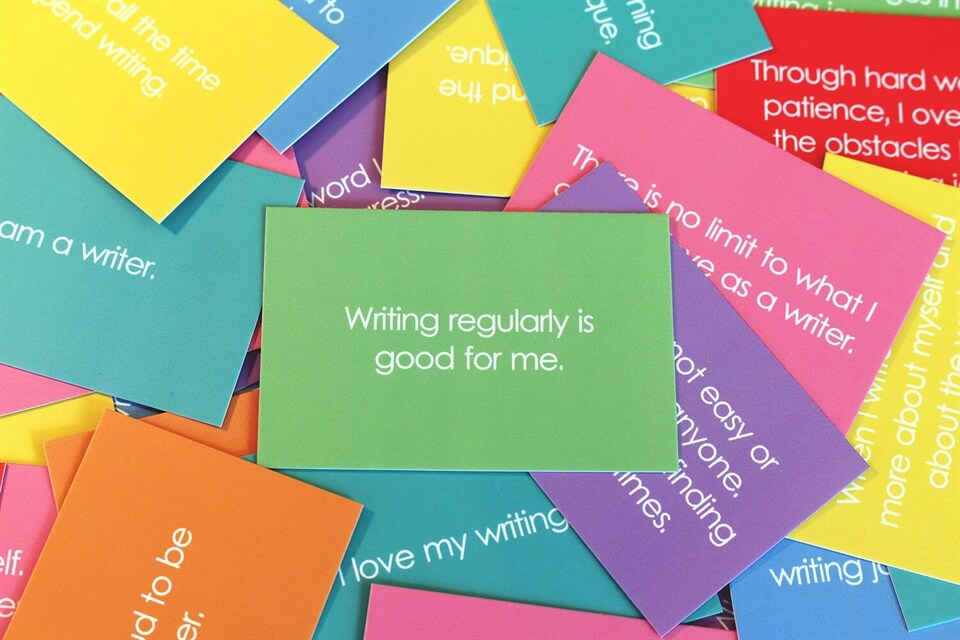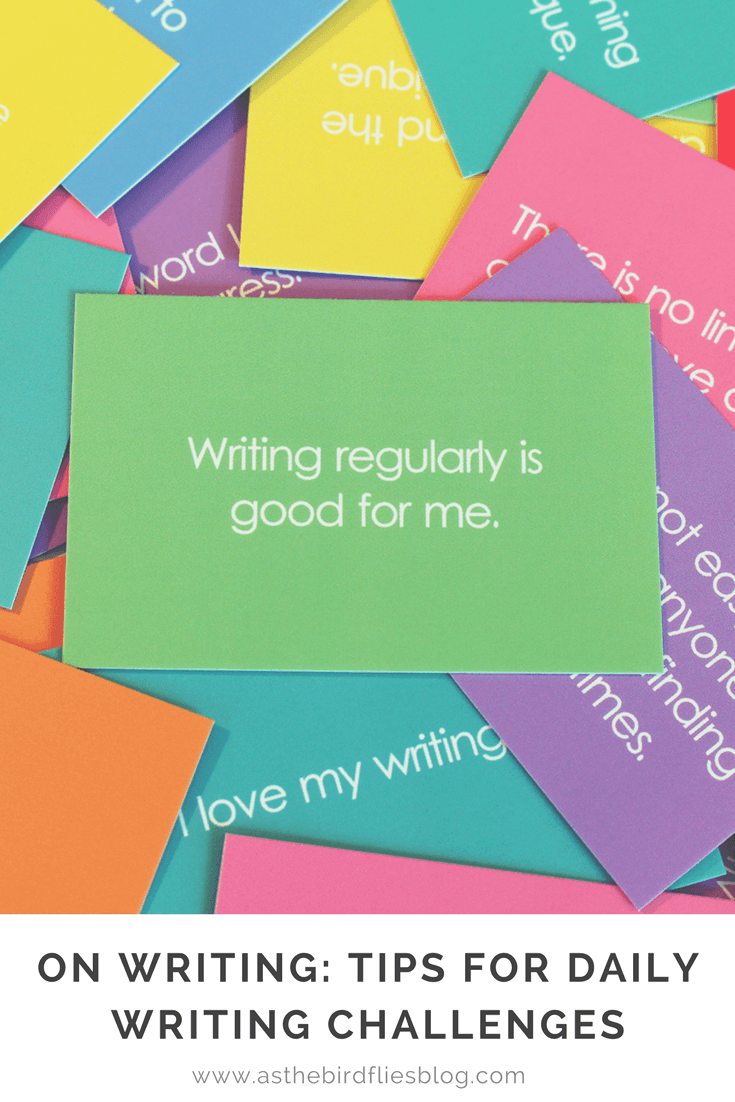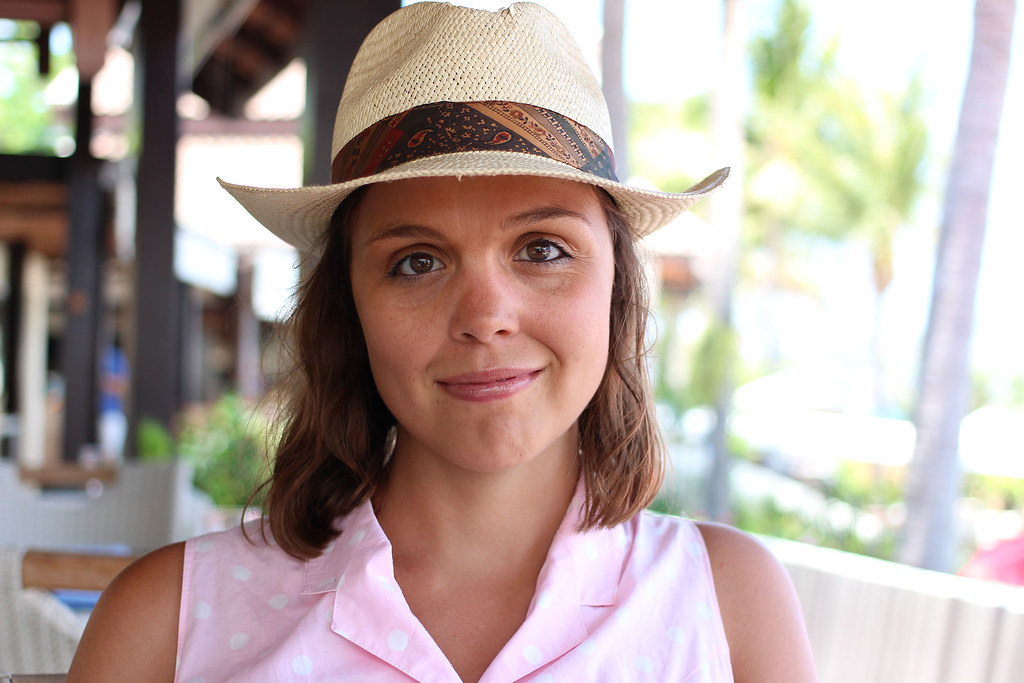On Writing: Tips for Doing a Daily Creative Writing Challenge

Last week saw the start of The 100 Day Project, an online movement that sees participants endeavour to create something every single day for 100 days in a row. Typically the project starts in early April and ends in July. Most participants try something arty or crafty and many document their progress and daily creations on Instagram or possibly on other social media. There's a fun community-spirit to be found among those taking part in this daily creative challenge, regardless of what you are working on, and I urge you to check out the official website to find out more information.
The question you're probably asking yourself, however, is what has this got to do with writers and writing? And where are these tips for doing a daily writing challenge that you've been promising us? Well, first let me explain a bit about my experience of taking part in a daily creative writing challenge.
My experience of daily creative writing challenges
Last year I took part in #the100dayproject for the first time and I wrote 100 poems in 100 days. It was a thrilling, challenging, eye-opening and highly rewarding experience for me. I started the project completely uncertain of what I was doing and I ended it 100 poems richer. I am hoping to turn these poems into a book later this year. You can read my full debrief of the experience in these lessons learned post.
The 100 Day Project is not typically a creative writing challenge but I absolutely believe it can and should be used by writers to give their creativity a little boost. No, our craft is not as visual or Instagram-worthy as that of painters, illustrators, crafters, dressmakers, knitters etc., but we do still have a lot of creativity to share. I would absolutely encourage any writer searching for a creative challenge to consider taking part in the 100 day project, and I'll highlight some of the reasons why. I'll also share a bunch of tips on doing a daily creative writing challenge, be it for 100 days or for 30 days, like during NaNoWriMo (which I've now completed six years in a row).
Why you should take part in a daily writing challenge
If my above experience hasn't convinced you that a daily writing challenge is worth it, let me list a few reasons why you should consider doing one:
- It stimulates creativity. While there's nothing romantic about forcing yourself to write something every day - and yep, it can be a bit stop-start and will occasionally get a bit (or very!) ugly - generally speaking, there is great truth in the fact that the more creative you are the more ideas you will have. As the wonderfully wise Maya Angelou said “You can't use up creativity. The more you use, the more you have.” I think it's because your brain simply gets more used to thinking, spotting, seeing, hearing new ideas all around you because you know you have to find them!
- You will try things you may have been reluctant to before. Last year I found myself writing poems about things I would never have imagined and it was strange, unsettling and so exciting! I felt so brave and like I was pushing myself in ways I hadn't before. It's amazing what forcing yourself to produce something every single day can do to push you outside of your comfort zone.
- It will make you prioritise writing. How many of us can honestly say that writing is a priority every single day? I know I currently can't, but when I take part in a creative writing challenge like NaNoWriMo, that changes and writing does become a priority. This is important to do once in a while and I can no longer make up excuses as to why I can't or shouldn't write.
- You will overcome challenges. There will come a time during any daily creative challenge when it gets hard. Maybe you stall in finding an idea you want to write about. Maybe you don't really like what you've written (so are reluctant to share). Maybe you have started something but can't finish it or you run out of time to meet your daily word count goal. Maybe life happens and you suddenly don't have enough time to do anything. All of these things are very possible (if not likely!) to happen during a daily creative writing challenge. The key is how not how you deal with them but how you deal with going back to writing. When you come across an obstacle to writing, deal with it, know that you can do that, but the next day (or a few days later, or whenever) you get back to writing anyway, that is where real growth and progress happens.
- You will learn more than you know about you, your writing and life itself. When you give your writing priority, you learn how important it is to you (or isn't, which is equally valuable!). When you experiment with your creativity you learn new ways to write, to express your ideas and to build on something. It may never see the light of day, but it's practice and that is what takes you places. When you come across challenges, but you KEEP ON GOING you learn that you have more courage, strength and determination than you realised.
- You will end the challenge with a body of work. This is arguably the best reason of all, because by the time you finish a daily writing challenge you will have SOMETHING. If you do NaNoWriMo, then you'll hopefully end up with 50,000 words of a first draft (or just 35,000 which is just as awesome). If you set yourself a challenge like my 100 poems in 100 days you will end the challenge with a body of work that can potentially be shared with the world. That's a huge deal and well worth celebrating.
Tips for doing a daily writing challenge
Regardless of what your daily writing challenge is and whether it's for an organised event like #the100dayproject or NaNoWriMo or if it's just something you're setting yourself, here are some tips and things to think about as you embark on a creative challenge as a writer.
It's okay to start small(er)
I am reluctant to encourage ALL writers to take part in #the100dayproject as a first creative writing challenge. I've been writing fiction and creatively for nearly eight years now and I've done several NaNoWriMos so I had quite a bit of experience writing regularly and going through the ups and downs of a daily writing challenge. No matter how many times I've done these challenges, it's still a stretch for any number of reasons. What is different now (compared to when I first started) is that I know this and I'm prepared for this, and I also have experience and a memory of what "success" at a creative writing challenge feels like. While I'm not going to say "don't do it" if you're a beginner writer, because if you feel up for it and you have a good idea what you want to write, then go for it, however, it could be more beneficial if you start smaller (say doing the same challenge but for 30 or 50 days) and to just see how you go from there. There are no rules saying you can't set and follow your own daily writing challenge, at any time of the year, and I have definitely considered doing this myself and am sure I will one day.
Have a focus, but not a ton of rules.
My focus last year was perfect (though I didn't know it at the time when I first started) but giving myself the mission of writing 100 poems in 100 days was narrow enough that I had to stick to poetry (and writing a new one every day) but it was flexible enough because there is actually no set definition of what a poem should be. Some of my poems were just six words long (though these were sometimes the hardest to write!) and others were two pages. Not all of them rhymed and very few of them followed any kind of strict rhythm or pacing. I took as many creative liberties as I wanted and I benefited greatly from that. Be good to yourself and keep the focus clear and not complicated with rules. Word counts are great because they keep you moving in one direction, but some days it takes me 30 minutes to write 1000 words, while other times that could take up to two hours. The point is you have to be generous with yourself as much as possible and keep it really simple. My best advice for a first daily writing challenge would be simply writing for 10, 15, or 30 minutes, whatever you think you can give. Set the clock, switch off the Internet and see what happens.
Do a little preparation
Prior to starting any creative writing challenge, it can pay in dividends to do a bit of preparation. Get yourself a new notebook, make sure you've got a note taking app on your phone (this is how nearly all my poems started last year) and cancel any unnecessary social engagements or commitments. If you need to fill your freezer with meals, and make sure you've got enough tea and coffee. If you live with people, I highly recommend telling them what you're about to do because then they can help you too by giving you space, making you drinks, bringing you biscuits and maybe even doing your share of the chores.
Be realistic
Whatever challenge you are considering embarking on, look ahead at the full time of the challenge and look for any other commitments or plans that are going to affect you spending regular time writing, for example, any travel, big social engagements like birthdays or weddings, or any other life events that are in the calendar (family members having an operation, or someone close to you who is about to give birth). You'd be surprised how these things have the potential to blow up and take over life a little (which is of course completely fine and normal and wonderful in many ways), but the answer is not to avoid doing the challenge completely because of pending engagements or existing commitments, but to accommodate this in your challenge. Last year, in addition to looking after my 18-month-old son half of the week (and working the other half!) I knew we were also going to be moving house during #the100dayproject, which is why I got ahead of myself and had some poems already written for the busier days of packing and unpacking, and I also was kind to myself in allowing poems as short as six words to be a poem enough!
Sharing is an important part of the journey, but not the MOST important
I haven't really discussed the sharing part of challenges like #the100dayproject but it's important we do, because they are a key part of the challenge. During NaNoWriMo you'll often find people sharing screenshots of word counts or even sharing photos of the pages they've written. Publicly sharing your work and progress is an important part of the challenge as it's a very effective way to hold yourself accountable for what you have committed to do. It can also be satisfying and encouraging when you look back on what you've achieved so far. However, it's not the be all and end all of a daily creative challenge. If you choose not to share your progress on social media (or anywhere) that's fine, because we should never assume that every single person is a) active on social media, or b) comfortable enough to share their work, especially if you're working on something like a first draft which needs to be messy and crappy because that's what first drafts are supposed to be! There are ways you can document your progress just for you and this can be pretty effective in terms of accountability too. Keep a spreadsheet of how many minutes a day you write (or if you want how many words you have written). Alternatively take photos of the work you do each day. If you're writing long-hand, use the same notebook or keep all your work in the same folder and find satisfaction in seeing it grow each day. Or you can share your progress with a loved one just by sending them regular updates. Maybe see if you have a writing friend who would be willing to also share their progress on the same challenge. This would be very effective for accountability.
Keep looking forward
While building a body of work and taking time to see and celebrate this is important during a daily writing challenge, it's more important (and helpful!) if you keep looking forward. It's going to be all too easy to get distracted when you are effectively forcing yourself to write every single day (we are only too good at finding excuses not to!) so keep the focus and your thoughts forward so that you know what you have to do - keep writing - rather feeling a little stagnant in your progress because you're looking back.
Don't lose the "just for fun" part
Now I've given you some tough talking, here is the nice bit. This should be fun. One of the best discoveries of any writing challenge I've done is that IT IS A LOT OF FUN. Of course I haven't enjoyed every single moment but I have enjoyed the majority of moments I spent on a daily writing challenge. That has been the biggest revelation for me as a writer because it teaches me that this is what writing is all about. It's not about how many words, how many books, how many sales, how much money I make as a writer; it's about how much enjoyment writing brings me. Unfortunately, I've also learnt that the enjoyment part is part and parcel of the struggles part. It seems you need to experience a little of the latter in order to feel the former. It's hard to remember this when you feel no words coming and you are so very tired and just want to go to sleep, but if you lose sight of this during a writing challenge, dare I say it, but it's probably not worth continuing. Creative writing challenges should never be embarked on to punish or push yourself beyond a place where you are learning and enjoying your craft. This is the most important thing to remember when you do find yourself meeting obstacles or hard days, because if you don't feel like you have any more enjoyment to find or treasure in your daily writing challenge, you should be kind enough to yourself to stop it and find some fun somewhere else.
Have you ever done a daily creative writing challenge? What are your tips for somebody about to start one for the first time?
The cards featured in the photos in this post are WriteNOW Cards - affirmation cards designed for writers to help you build and enjoy your writing practice - they're available to buy in packs of 10 or 50 here.
And if you'd like to share or save this post, here's an image you can pin:


Frances M. Thompson
Find Frankie on Facebook, Twitter, Instagram, Pinterest, and Google+.
 On Writing: My Writing & Publishing Plans for 2023
On Writing: My Writing & Publishing Plans for 2023_x300.jpg?v=1) On Writing: The Year I Decided to Write for My Life
On Writing: The Year I Decided to Write for My Life On Writing: Best (& Easiest!) Creative Habits All Writers Should Try
On Writing: Best (& Easiest!) Creative Habits All Writers Should Try On Writing: How to Earn Money by Writing Stories
On Writing: How to Earn Money by Writing Stories On Writing: What Are The Different Types of Editors?
On Writing: What Are The Different Types of Editors? About the Blog & Frankie
About the Blog & Frankie Welcome to My Amsterdam Travel Blog!
Welcome to My Amsterdam Travel Blog! Welcome to My Luxury Family Travel Blog!
Welcome to My Luxury Family Travel Blog! Welcome to My Writing Blog!
Welcome to My Writing Blog! Lover Mother Other: Poems - Out Now!
Lover Mother Other: Poems - Out Now! I Write Stories That Move You
I Write Stories That Move You Order WriteNOW Cards - Affirmation Cards for Writers
Order WriteNOW Cards - Affirmation Cards for Writers Work With Me
Work With Me